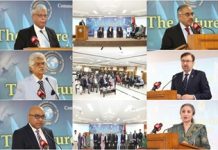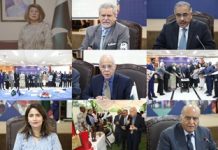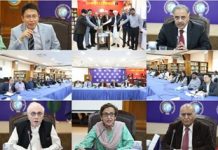ISLAMABAD: Federal Minister for Planning, Development and Reform Ahsan Iqbal said on Wednesday that Pakistan possessed the attributes of an advancing nation, and was well-positioned to rank among the world’s top 25 economies by 2025.
“The signs of a failing country cannot be attributed to Pakistan now that there is a clear vision, an independent judiciary, free media, and a growing civil society with a strategic economic roadmap standing on strong, democratic foundations,” he said, while addressing a national conference titled ‘Building Knowledge Based Economy in Pakistan’.
He said that his optimism was supported by the improving law and order situation, sustainable economic growth, and a favourable investment environment.
“At least the direction is right,” Iqbal said.
The conference was organised by the Islamabad Policy Research Institute (IPRI) alongside the Hanns Seidal Foundation.
Iqbal said that the ministry’s ‘Vision 2025’ emphasizes human resource development, regional connectivity, knowledge economy, inclusive growth, and shared prosperity.
He said that human resource development is at the top of the government’s priorities, and that education is being targeted through increased funding for higher education.
Iqbal also proposed a United States (US)-Pakistan knowledge corridor, which would allow Pakistan to benefit from the high quality science and technology education available in US universities.
“It is unfortunate that despite being a strategic partner, Pakistan was not given preferential treatment in terms of its students availing higher education opportunities in US universities,” he said.
Speakers at a subsequent panel at the conference discussed the reasons behind the stable economic growth enjoyed by countries such as Japan, South Korea, and Germany, despite the countries’ devastation due to war.
The panel highlighted how, in the 1950s when the Gross Domestic Product (GDP) of South Korea was less than Pakistan’s, their literacy rate was 62 per cent – something Pakistan has yet to achieve.
Senator Farhatullah Babar said that one major issue in Pakistan was the inconsistent policymaking by successive governments.
Dr. Usman Mustafa, from the Pakistan Institute of Development Economics (PIDE), said that the economy revolves around agriculture in its first phase, however, after the industrial revolution wealth became associated with manufacturing and commerce. He said that in the current era, wealth is linked with the ‘ownership of knowledge’ needed to produce goods and services.
“Not only are we talking about producing at low costs with better quality, there is now an increased demand for information,” Mustafa said.
The speakers, most of whom were economists, called for higher investments in research and development (R&D).
However, Dr. Tariq Bashir, from the Pakistan Council of Science and Technology, blamed both the government and stakeholders for not investing in knowledge generation, and said that the private sector should establish R&D centres for specific sectors to improve the competitive standing of exports.
Azhar Majeed, from the Federation of Pakistan Chambers of Commerce and Industry (FPCCI) said that the textile sector is facing severe challenges, and has remained stagnant for five years.
“But one of the most severe issues we face, apart from the energy crisis, is $1.5 billion stuck with the Federal Board of Revue for refunds,” he said, adding, “Which industry would be willing to invest in R&D in such conditions?”
Source: http://www.dawn.com/news/1206030/pakistan-poised-to-rank-among-top-25-
economies-by-2025












